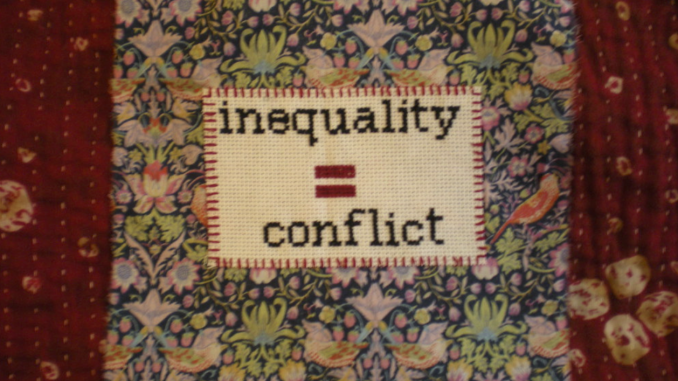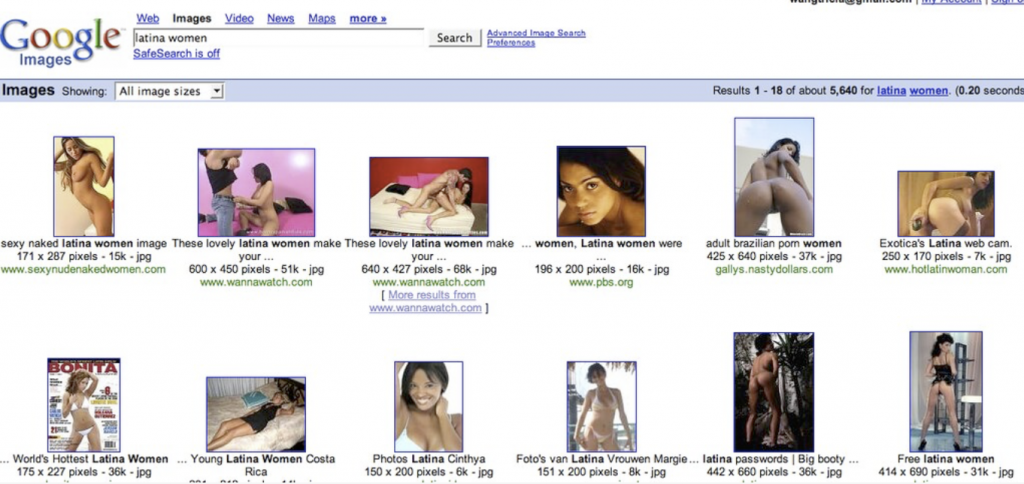
The Internet provides media platforms and communication channels for mass information, breaking the space and time limits of information dissemination to a considerable extent. It could be concluded that the development of the Internet actively promotes global information visualization, promoting the popularization of information sharing and reduces the cost of information transmission. As Friedman, Thomas L has said, the Internet and globalization have the power to flatten the world (Friedman, Thomas L, 2006). But the fact that all kinds of information are presented straightly on the same platform for anyone does not mean more equal resources distribution. The Internet is widening gender, race and social class gaps and inequalities as information access preferences and the ability to use the internet of users are skewed. Although social inequality and Hierarchical solidification becoming norms, Internet development is not the primary cause of social inequality. However, the growth of the Internet has given various new forms to long-standing inequities, therefore hidden and changeable features of the internet are possibly lead inequities and discrimination to become more difficult to constraint and supervise.
Figure1 “Latina Women” by Tricia Wang 王圣捷 is licensed under CC BY-NC-SA 2.0
The normalization of gender discrimination
The Internet development has allowed misogyny and objectification of females to spread more freely and with reasonable frequency. Globally, the prevalence of gender inequality is a common fact of life. Oppressed by male hegemony, women have been in vulnerable positions in society as a long-term trend. For instance, the unequal pay of men and women for the same work in the labour market and the deprivation of female voice and their personal willingness. Whether in reality or on the Internet, the image and identity of females are mostly defined by the male perspective who has more rights of speech. Significantly, women of colour are doubly oppressed by racial and sexual discrimination. This can be seen most clearly in Google search term preferences, where terms to describe and relative Latin women are heavily discriminatory and sexually suggestive. This phenomenon proves that men have a decisive say in the definition of female identity in the Internet environment. Since the information search preference is determined by clicks and the commercial value of paid advertising (Noble, 2018), some females possibly do not have enough power and capital to change the male-dominated direction of public opinion as a socially marginalized group. Simultaneously, Internet supervision hardly interferes with large company platforms in this highly commercialized and profit-oriented society. The Internet simply operates as a platform for aggregating data from the masses, In other words, the consciousness orientation or relevance presented by the Internet is largely determined by the preferences of internet users. The development of the Internet shows males’ stereotyping, objectification and sexualization of females more intuitively visible to the public. Unabashed prejudice and discrimination give Internet users an unrecognized illusion: if an idea is acceptable and reasonable if it exists openly on a popular social platform. It can be argued that although the development of the Internet is not the decisive cause of the aggravation of gender inequality, it normalizes and popularizes the demeaning and prejudice against women and people of colour in social public opinions. Therefore, the development of the Internet seems to provide an equal development platform and information sharing for each gender, but it actually encourages the naturalization of gender inequality.
Rationalizing the maintenance of elite interests
The development of the Internet enables everyone to become producers of information, which seems to enhance the democratic power and freedom of public expression. However, users actually face several threats of private data intrusion and the class divide brought about by the commercialization of the Internet. By exploiting the control of public data, technology companies are able to easily create network effects to maintain their monopolies. Namely to spread the idea that “the Internet can solve pressing social problems by running on its own” (Popiel, 2018) to the public, that is, the consciousness of “Internet centrism”. This makes the Internet seem to serve the public interest completely and greatly weaken government control, but in fact, it rationalizes the maintenance of elite interests. The public interest is no longer a serious issue since it looked that the public has largely realized their democratic rights and enjoys the convenience brought by the development of the Internet. Meanwhile, technology companies have used lobbying groups (Popiel, 2018)to build mutually beneficial and protective relationships with the government. While portraying the government as an untrustworthy institution which in order to maintain its regime, so infringes on public privacy and suppress the commercialization of the internet. So far, the Internet has not really benefit for public interest or improve basic public services. Instead, it has strengthened the monopoly of technology companies on Internet commercial interests and sharp the class contradictions between ordinary citizens and the elite class.
Moreover, although the development of the Internet has enabled the browsing and dissemination of information without geographical restrictions, the rules and laws of the Internet vary from different nation. It meant there without Internet security law that applies to all users around the world (Terry, 2019), which creates security risks for Internet use. For example, criminals who spread racism, hate speech and harassment online are more likely to not be held accountable since there possibly exist areas where language violence is not illegal. It is unfair to those who are advocating a peaceful and friendly Internet environment because their kindness of following the ethical rules cannot be protected by corresponding laws and institutions. Therefore, seemingly the convenience of Internet development to reduce space restrictions, but which has covered up and connived at the prevalence of racial discrimination speech, causing negative impacts on the equality of all races and cultures.
Information asymmetry between different classes
Moreover, internet-driven innovation has largely reduced economic opportunities for some classes and exacerbated inequality. With the development of the economy and the commercialization of various fields, the original explicit inequality in material life began to turn inconspicuous. However, the growth of the Internet has provided some new, hard-to-detect inequalities. As Turner argues, platform democratization does not equate to true democratization(Turner, 2021). The massive opening up of a platform with low participation standards does not equal rational differentiation of resources. The disparity in the ability to comprehensively analyze and extract information is the main cause of inequality, which is embodied concretely in the Internet resources using methods that largely depends on the Internet users themselves. For example, some participants are able to keenly aware that the digital economy rising, and knowledge payment might revolutionize the commercialization form of the Internet and make profits faster. Conversely, for the primary network users who cannot screen out valid information, the network cannot provide them with practical economic benefits. They can only use the Internet as an entertainment tool or even get lost in the confusion of excessive information. The formerly highly educated upper classes have more access to resources and benefit for themselves, while the general public still lacks the ability to profit from them. Therefore, could consider that the information asymmetry caused by the development of the Internet accelerates social differentiation.
Conclusion
The development of the Internet puts all kinds of information on the same platform, which means that everyone who uses the Internet has the opportunity to participate in the world. But for those who are unable to distinguish and extract information, equality may never have been achieved. The development of the Internet has not ameliorated the world existing structural inequities but gives new forms of inequity. The Internet has not actually solved the problems of women face more challenges in the workplace and society, nor solve the unequal distribution of resources and racial discrimination across social classes. Instead, it takes advantage of the virtuality of the Internet to provide protection and cover for social risk factors and make them even more difficult to detect and solve.
Reference:
Lusoli, Alberto, and Turner, Fred (2021), ‘“It’s an Ongoing Bromance”: Counterculture and Cyberculture in Silicon Valley—An Interview with Fred Turner. Journal of Management Inquiry 30(2), pp. 235-242.
Noble, Safiya U. (2018) A society, searching. In Algorithms of Oppression: How search engines reinforce racism. New York: New York University. pp. 15-63.
Popiel, Pawel (2018) ‘The Tech Lobby: Tracing the Contours of New Media Elite Lobbying Power’. Communication, Culture & Critique 11(4), pp. 566-585.
Terry Flew (2019), ‘Guarding the Gatekeepers: Trust, Truth and Digital Platforms’, Griffith Review 64, pp. 94-103.
Friedman, Thomas L (2006) The world is flat: a brief history of the twenty-first century. Camberwell, Vic. : Penguin.
